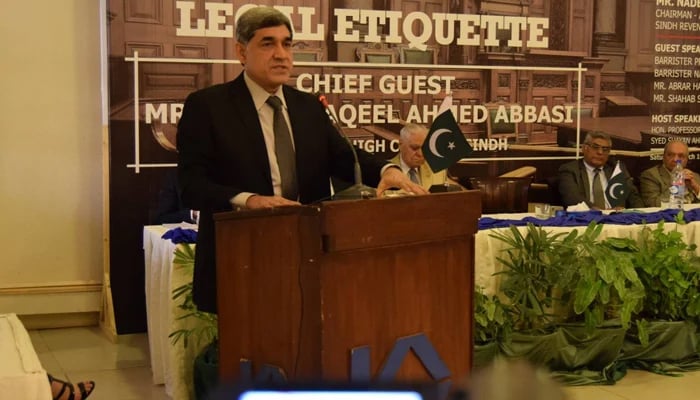Judiciary does not take dictation from anywhere, says SHC acting chief justice
The judiciary does not take dictation from anywhere and works within its constitutional limits.
Sindh High Court Acting Chief Justice Aqeel Abbasi said this on Saturday as he addressed the Malir Bar Association.
Justice Abbasi, who recently became the acting chief justice of the SHC after last acting SHC chief justice, Irfan Saadat Khan, was elevated to the Supreme Court by the Judicial Commission of Pakistan, told the lawyers of the Malir Bar Association that he would try to fulfil his responsibilities according to the Constitution and oath of his office.
As the acting chief justice, he said he would strive to ensure justice was not only done but also seen as being done. He emphasised the principle of transparency in judicial process and stated that no one should think that the judges took dictation from somewhere else.
Justice Abbasi said he wanted to convey this message to everyone that justice is everyone's right and justice should be accessible to all. "Our fundamental responsibility is to dispense justice without any bias or influence, be it from judicial institutions or the legal profession," he maintained.
"The bench faces unnecessary pressure from the bar. While we welcome positive and constructive criticism, the bar also bears the responsibility of self-regulation. It is essential to listen to each other and keep our doors open for everyone. Nothing is impossible in the world if we move in the right direction," the SHC acting chief justice remarked.
He said there should be a distinction between trade unions, labour unions and lawyers. "If you desire that decisions are made solely according to your will, the institution will be destroyed."
Justice Abbasi said judges could not be corrupt and dishonest. "A judge must be honest, resilient, and must always maintain courage. Without resilience, how will a judge stop an oppressor?" he remarked.
He said the lawyers should keep in mind that they were answerable to God Amighty and instead of ruining a case, they must plead it after preparation.
He requested the lawyers not to try to distort the facts. The main reason for delays in cases is the lack of cooperation from lawyers, he stressed, adding that lawyers should not try to prolong cases by taking unnecessary adjournments.
-
 James Van Der Beek's Final Conversation With Director Roger Avary Laid Bare: 'We Cried'
James Van Der Beek's Final Conversation With Director Roger Avary Laid Bare: 'We Cried' -
 Jaden Smith Walks Out Of Interview After Kanye West Question At Film Premiere
Jaden Smith Walks Out Of Interview After Kanye West Question At Film Premiere -
 Michelle Obama Gets Candid About Spontaneous Decision At Piercings Tattoo
Michelle Obama Gets Candid About Spontaneous Decision At Piercings Tattoo -
 Why Halle Berry Wasn't Ready For Marriage After Van Hunt Popped Question? Source
Why Halle Berry Wasn't Ready For Marriage After Van Hunt Popped Question? Source -
 Bunnie Xo Shares Raw Confession After Year-long IVF Struggle
Bunnie Xo Shares Raw Confession After Year-long IVF Struggle -
 Brooks Nader Reveals Why She Quit Fillers After Years
Brooks Nader Reveals Why She Quit Fillers After Years -
 Travis Kelce Plays Key Role In Taylor Swift's 'Opalite' Remix
Travis Kelce Plays Key Role In Taylor Swift's 'Opalite' Remix -
 How Jennifer Aniston's 57th Birthday Went With Boyfriend Jim Curtis
How Jennifer Aniston's 57th Birthday Went With Boyfriend Jim Curtis -
 JoJo Siwa Shares Inspiring Words With Young Changemakers
JoJo Siwa Shares Inspiring Words With Young Changemakers -
 James Van Der Beek Loved Ones Breaks Silence After Fundraiser Hits $2.2M
James Van Der Beek Loved Ones Breaks Silence After Fundraiser Hits $2.2M -
 Disney’s $336m 'Snow White' Remake Ends With $170m Box Office Loss: Report
Disney’s $336m 'Snow White' Remake Ends With $170m Box Office Loss: Report -
 Travis Kelce's Mom Donna Kelce Breaks Silence On His Retirement Plans
Travis Kelce's Mom Donna Kelce Breaks Silence On His Retirement Plans -
 Premiere Date Of 'Spider-Noir' Featuring Nicolas Cage Announced
Premiere Date Of 'Spider-Noir' Featuring Nicolas Cage Announced -
 Pedro Pascal's Sister Reveals His Reaction To Her 'The Beauty' Role
Pedro Pascal's Sister Reveals His Reaction To Her 'The Beauty' Role -
 Kate Middleton Proves She's True 'children's Princess' With THIS Move
Kate Middleton Proves She's True 'children's Princess' With THIS Move -
 Paul Anka Reveals How He Raised Son Ethan Differently From His Daughters
Paul Anka Reveals How He Raised Son Ethan Differently From His Daughters




